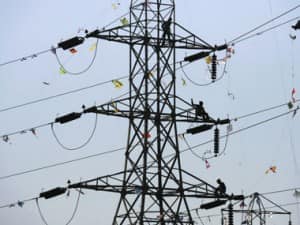By R Jagannathan
The telecom spectrum auction hangs over the industry - and also policymakers - like some kind of Damocles’ Sword.
The Telecom Regulatory Authority of India (Trai) has now dug in its heels and says its reserve price of Rs 18,000 crore plus for 5 Mhz of all-India spectrum is not unreasonable. Trai Chairman Rahul Khullar, who was once thought of as an industry-friendly face, now says that “there is no latitude with the policymaker anymore to fiddle with that price.”
[caption id=“attachment_380593” align=“alignleft” width=“380”]
 Not only will the price for spectrum be high, but telcos are suddenly going to be overloaded with debt after the auction. Reuters[/caption]
Not only will the price for spectrum be high, but telcos are suddenly going to be overloaded with debt after the auction. Reuters[/caption]
The government, which has already notified a broad outline on how the auction will be conducted, is waiting for the presidential poll to get over to take a final call on spectrum pricing. It will seek more time from the Supreme Court beyond the 31 August deadline, but the problem won’t go away even if the court agrees.
The presidential reference, in which the government has asked whether auction is the only way to give away scarce natural resources, may give it some leeway, but the cancellation of 122 licences will not be reconsidered.
Impact Shorts
More ShortsWhat we can be certain of are the following: spectrum will indeed be sold by auction. The Cabinet will probably go along with what Trai has suggested, barring a few business-friendly tweaks. It is also likely that telcos will have to pay more for the excess spectrum they hold. And spectrum will be refarmed as licence periods expire for the older operators.
Industry is shuddering at the thought for obvious reasons: not only will the price for spectrum be high, but telcos are suddenly going to be overloaded with debt after the auction. Some companies may not be able to borrow from banks at all, even though spectrum will be treated as an asset that can be pledged. Plus, there is the problem of raising so much money so quickly.
Khullar said as much to The Economic Times: “Some companies are grossly over-leveraged. Even if banks have money, these firms can’t borrow because their leverage ratios are stretched. Secondly, when you have debt exposure of close to Rs 2,00,000 crore, how are you going to add another Rs 150,000 crore? Where’s it going to come from?”
Quite clearly, telcos will have to raise equity in a tepid market in order to be able to borrow even more from banks. We could see an avalanche of equity issues later this year.
Is there a way out?
There is, but it will need the government to think of the auction and reserve prices differently.
Currently, the structure favours one-time bids for 20 years of spectrum and a periodic spectrum fee that could be 3 percent (recommended by Trai) or more.
The only sensible way out is to make spectrum fee the object of the auction.
In short, the auction should be about asking telcos to bid for the highest spectrum fee they are willing to pay - and bidders will have to match the highest bids for spectrum allocation.
Thus, the winner would be the one who offers the highest spectrum fee in terms of Adjusted Gross Annual Revenue Share (AGR). If Bharti bids 3 percent per annum for each 1 Mhz of all-India spectrum, it would win. If Vodafone bids 3.1 percent it would win. The others would have to pay a matching rate to get spectrum.
If this is done, there are several advantages.
One, telcos would not have to borrow enormous sums upfront and ruin their balance-sheets.
Two, government does not lose revenue. But it may receive less upfront fees. But this is good. Remember, the government simply blew up the Rs 1,06,000 crore it received in 2010 for the 3G and Broadband Wireless Access auctions in one year. It would be more prudent to give the government its revenues spread over 20 years.
Three, the money payable would vary from telco to telco, depending on the size of their business at any point of time.
Four, banks would still be able to lend against the collateral of spectrum.
Five, since the auction proceeds will come in stages, the government could raise the upfront licence fees to, say, Rs 1,500 crore.
Any takers?
The Business Blog is a daily business blog anchored by Firstpost senior editors. It will offer quick comments and insights into major business news developments from the pink press.
)